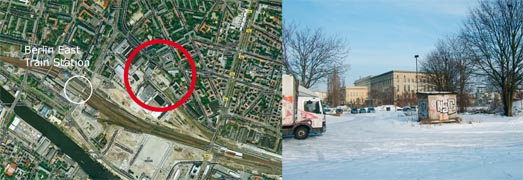École Spéciale d'Architecture
19 - 24 March 2010

Berlin’s reputation as one of the most creative cities in the world has
resulted in a recent boom of 'creatives' moving into the city from all
over the world. This in turn is triggering the emergence of new
developmentsin the city, much as German reunification triggered a
development boom in the '90s. These new developments are making
significant changes to their urban contexts and are impacting massively
on the demographic character of each district.
In Friedrichshain the new so called ‘Mediaspree’ district is currently
under construction, and includes the refurbishment of old warehouses as
well as the construction of new buildings. Across Warschauer Straße
towards the city centre, the new O2 World signals
the start of development on a huge site between railway tracks and the
East Side Gallery. Behind those tracks lies another, as yet
undeveloped, area which was part of the former Wriezener train station.
Knowing that young 'creatives' and cultural centres are often forced to leave their area due to new developments, the task for this semster is to create ‘The Wriez’ on this site - a new cultural station for Berlin’s creative and experimental minds, a place to meet and join groups for sport, events and public discussions. The idea of creating a cultural station in this context follows successful developments of former train stations or industrial areas into cultural centres all around the world.
The architectural and urban design treatment should create a positive symbosis with the existing surroundings and should develop new ideas for public use of the space. The original and distinctive character of the area has to be retained and it is of particular interest that the few remaining structures of the Wriezener Bahnhof - which dominate a big open space - be incorporated in the scheme. The treatment should create a positive symbiosis with the existing surroundings and should develop new ideas for public use of the space. The site could also become a framework for various uses and activities over time and therefore be an experimental architecture in the context of these new urban developments.

